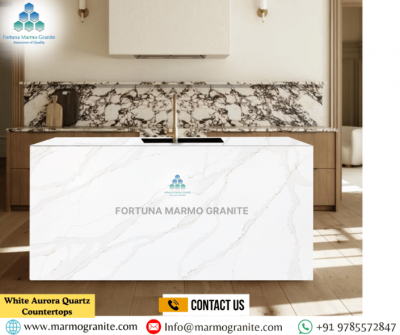Quartz vs. Granite Countertops: Why Quartz Takes the Lead in Modern Kitchens
Quartz vs Granite Countertops The heart of any home, the kitchen, constantly evolves in functionality and aesthetics. Central to this change are the countertops, which endure daily use while shaping the overall design. For years, granite reigned supreme as the symbol of luxury and durability. However, a new contender is gaining popularity and, in some ways, surpassing this natural stone: quartz.
In this exploration, we compare quartz and granite countertops, examining their strengths and weaknesses across key aspects. From durability to maintenance and aesthetics to functionality, this guide provides insights into the unique qualities of each material. It empowers homeowners and designers to make informed decisions.
Granite is known for its timeless elegance and natural beauty. It offers a unique, one-of-a-kind appearance that adds sophistication to any kitchen. Its resilience, scratch resistance, and heat tolerance make it ideal for high-traffic areas. However, despite its durability, granite requires regular sealing to maintain stain resistance and prevent moisture absorption, which may be a concern for some.
Understanding the Composition: Nature's Artistry vs. Engineered Excellence
Granite: A Symphony of Natural Minerals
Granite is an igneous rock formed deep within the Earth's crust through the slow crystallization of magma. This natural process creates a unique mix of minerals, primarily feldspar, quartz, and mica, with trace amounts of others that produce its diverse colors and patterns. Each slab is a one-of-a-kind masterpiece, shaped by geological forces over millennia. Its natural veining, speckling, and color variations are part of its charm, appealing to those seeking a truly unique aesthetic.
Quartz: Engineered for Performance and Consistency
In contrast, quartz countertops are engineered stone products. They are created by combining approximately 90-95% ground natural quartz – one of the hardest minerals on Earth – with 5-10% polymer resins and pigments. This mixture is then compressed and heated under vacuum to form a dense, non-porous slab. The manufacturing process allows for greater control over the color, pattern, and texture of the final product, resulting in a more consistent appearance compared to natural stone. While quartz incorporates natural quartz, it's the engineering aspect that imbues it with many of its distinct advantages.
Durability and Maintenance: Standing the Test of Time
Granite: Enduring Strength with Porous Vulnerability
Granite is undeniably a hard and durable material, resistant to scratches and heat. However, its inherent porosity is a significant drawback. The microscopic pores within the stone can absorb liquids, including water, oils, and food stains, leading to permanent discoloration and the potential for bacterial growth if not properly sealed and maintained. Regular sealing, typically every 1-2 years, is essential to protect granite's integrity and appearance. Additionally, while strong, granite can be susceptible to chipping or cracking under heavy impact, particularly at edges and corners.
Quartz: Non-Porous Perfection and Exceptional Resilience
The engineering process behind quartz countertops creates a non-porous surface. This enhances both durability and ease of maintenance. The lack of pores makes quartz highly resistant to stains from substances like coffee, wine, and oil. It also removes the need for regular sealing, saving time and effort. Additionally, the resins used in manufacturing add flexibility, making quartz less likely to chip or crack compared to granite. While not completely heat-proof, quartz can generally withstand normal kitchen temperatures.
Aesthetics and Design Versatility: Tailoring to Modern Tastes
Granite: Natural Beauty and Unique Character
Granite's natural formation produces a wide array of colors and intricate patterns, from subtle veining to bold swirls and speckles. Each slab tells a geological story, offering natural luxury and individuality. This variation, while appealing, can make it difficult to achieve a perfectly uniform look across large countertops or when matching multiple slabs. Granite's aesthetic generally leans toward a traditional or rustic style, though honed or leathered finishes can add a contemporary touch.
Quartz: Consistent Elegance and Design Flexibility
Quartz offers a wide range of design possibilities due to its controlled manufacturing process. It can mimic natural stones like marble and granite with remarkable accuracy, often with more consistent color and pattern. Beyond imitating natural stone, quartz is available in solid colors, subtle patterns, and unique textures. This versatility suits many modern design styles, from minimalist and industrial to sleek and sophisticated. Its consistency makes quartz ideal for uniform surfaces and seamless integration with other kitchen elements.
Maintenance and Cleaning: Effortless Upkeep for Busy Lifestyles
Granite: Requires Regular Sealing and Careful Cleaning
Due to its porosity, granite requires regular sealing to prevent staining and bacterial growth. This adds to the long-term maintenance effort and cost. Cleaning granite typically involves using pH-neutral cleaners to avoid damaging the sealant. Spills need to be wiped up promptly to prevent absorption.
Quartz: Low-Maintenance Convenience
The non-porous nature of quartz makes it incredibly easy to clean and maintain. Most spills can be wiped away with a damp cloth and mild soap. The absence of pores eliminates the need for sealing, saving significant time and effort over the lifespan of the countertop. This low-maintenance aspect makes quartz an ideal choice for busy individuals and families.
Cost Considerations: Balancing Investment and Value
Granite: Price Varies with Rarity and Complexity
The price of granite can fluctuate significantly based on the quarry of origin, the rarity of the color and pattern, and the thickness of the slab. More exotic and visually striking granite varieties often come with a higher price tag. Fabrication and installation costs can also vary depending on the complexity of the countertop design and the number of cutouts required.
Quartz: Competitive Pricing with Long-Term Savings
While the initial cost of quartz can be comparable to or sometimes slightly higher than some grades of granite, it often offers better long-term value. The lack of required sealing and the ease of maintenance can translate to cost savings over time. Furthermore, the consistent pricing of many quartz options can make budgeting more predictable.
Environmental Impact: Considering Sustainability
Granite: Natural Extraction and Potential Waste
Granite is a natural resource that requires quarrying, which can have environmental consequences such as habitat disruption and energy consumption for extraction and transportation. The fabrication process can also generate waste in the form of stone remnants.
Quartz: Utilizing Natural Resources Responsibly
While quartz countertops utilize a significant amount of natural quartz, the manufacturing process often incorporates recycled content. The controlled production minimizes waste compared to the extraction and fabrication of natural stone. Additionally, the durability and low-maintenance nature of quartz can contribute to a longer lifespan, reducing the need for replacement and its associated environmental impact.
Conclusion
Indian Granite Supplier When it comes to choosing between quartz and granite countertops for modern kitchens, quartz undoubtedly takes the lead for its exceptional durability, low maintenance, and consistent appearance. While granite offers a natural and unique aesthetic, quartz provides a more refined and versatile surface that can seamlessly blend with contemporary kitchen designs. Quartz vs Granite Countertops resistance to stains, scratches, and moisture, along with a wide range of colors and patterns, makes it an ideal choice for busy households seeking both functionality and style. Quartz vs Granite Countertops
At Fortuna Marmo Granite, we understand the importance of quality and elegance in every kitchen space, which is why we proudly offer a diverse collection of premium quartz surfaces that combine beauty and strength effortlessly. Whether you're looking to enhance your kitchen's aesthetic or elevate its practicality, Quartz vs Granite Countertops our expertly crafted quartz countertops are designed to meet the demands of modern living while adding a touch of sophistication to your home. Quartz vs Granite Countertops Visit our website to explore our extensive range and discover why quartz countertops are the ultimate investment for a timeless and contemporary kitchen.



